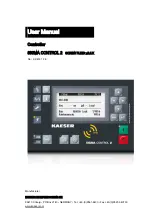
FlexSmart TRMS Module (S-FS-TRMSA & S-FS-TRMSA-D) Manual
1-800-LOGGERS (564-4377) • 508-759-9500
www.onsetcomp.com/support/contact
© 2008–2018 Onset Computer Corporation. All rights reserved. Onset, HOBO, FlexSmart, HOBOware, and
HOBOlink are trademarks or registered trademarks of Onset Computer Corporation. All other trademarks are
the property of their respective companies.
10093-H MAN-S-FS-TRMSA
Module Connections
Potential Transformers (PT) and Current Transducers (CT) are
connected to the module via a four-pin Phoenix-style
detachable screw terminal connector. Once the PTs and/or CTs
are connected, the module can then be configured using
HOBOware software with the module installed on the HOBO
H22 or U30 series logger or using HOBOlink® with the RX3000
station.
Note:
There are limitations to the number of modules
and smart sensors you can use with an RX3000 station. If you
are using both TRMSA-D modules and smart sensors, then you
are limited to a maximum of three TRMSA-D and any
combination of smart sensors to reach a total of 13 data
channels. For example, if there are three TRMSA-D modules in
use with the RX3000 station (each module has two channels for
a total of six in all), then this will leave seven additional data
channels for smart sensors. Similarly, if there are two TRMSA-D
modules in use with RX3000 station, then this will leave nine
additional data channels for smart sensors. Refer to the smart
sensor manuals at www.onsetcomp.com/support/manuals for
the number of data channels used by a specific smart sensor. If
you are not using smart sensors with the RX3000 station, then
you are limited to a maximum of four TRMSA-D modules.
Exceeding these guidelines may result in erroneous readings.
The diagram below illustrates
typical
connections for a PT and
CT. For module connection instructions specific to PTs and CTs
purchased from Onset, refer to the documentation provided
with each PT and CT.
Note:
For three-phase monitoring, each of the three modules
should be wired so that similar parameters are connected to
corresponding pin numbers. For example, voltage inputs pins 1
and 2 on each module; current inputs pins 3 and 4 on each
module.
Measurement Averaging
This module supports measurement averaging. When
measurement averaging is enabled, data is sampled more
frequently than it is logged. The multiple samples are then
averaged together and the average value is stored as the data
for the interval. For example, if the logging interval is set at 10
minutes and the sampling interval is set at 1 minute, each
recorded data point will be the average of 10 measurements.
Measurement averaging is useful for reducing noise in the data.




















